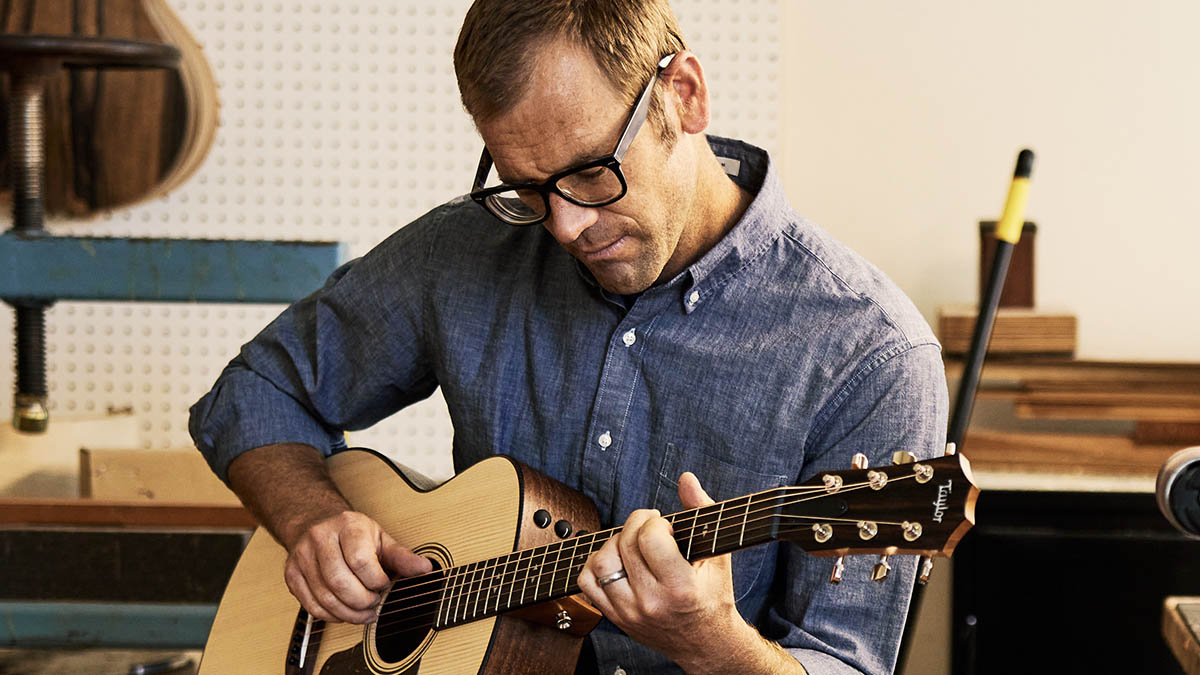Trixie Mattel: “I’m a product, right? If they want a singing, guitar playing, joke-telling Barbie doll, they have to get me. Or they have to get Dolly Parton”
The superstar of drag on how guitar became her showbiz USP, and how her act informs the fabricated reality behind her new double album’s effervescent power-pop sound
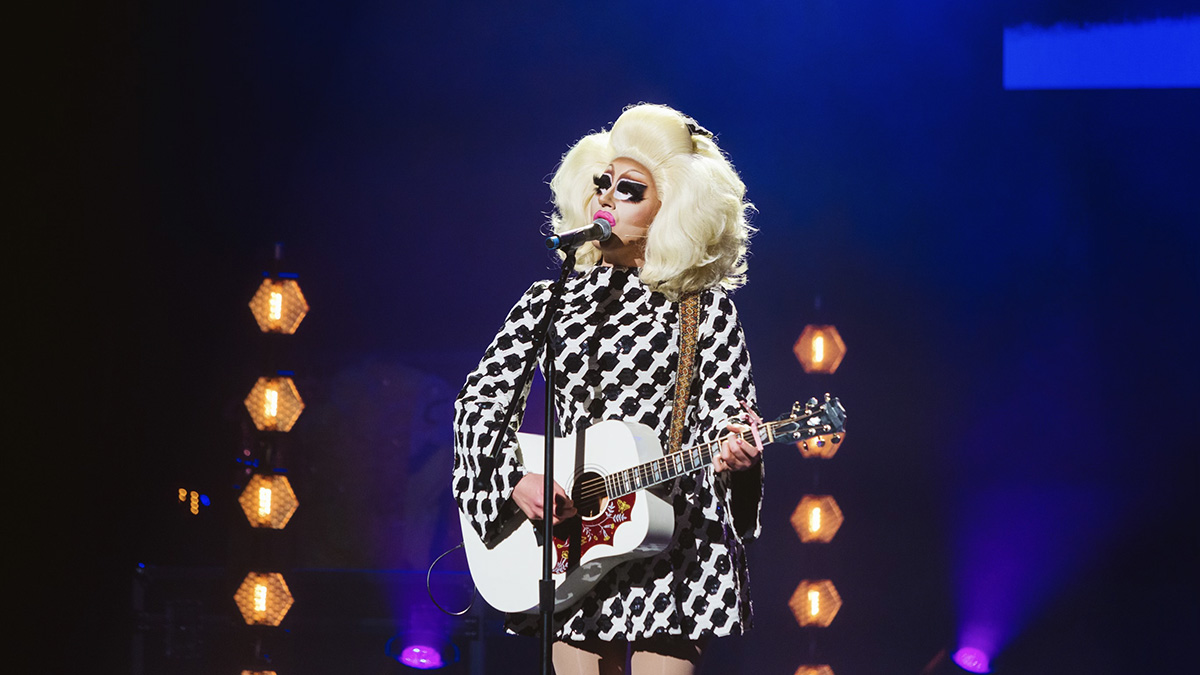
Trixie Mattel is everywhere. The drag star, musician, writer and entrepreneur has graced myriad stages, television screens, YouTube videos and more as she’s gone on her journey of selling her talents and her products to her adoring fans.
Mattel releases her latest musical work today, a double album called The Blonde & Pink Albums, each of which include seven songs. To support the release, Mattel has dropped a number of music videos for songs such as Hello Hello, and recently performed on the late night show, Jimmy Kimmel Live!
We caught up with Mattel (born Brian Michael Firkus) to talk about her humble beginnings growing up in a trailer in the “middle of nowhere,” how she found guitar, her stint on RuPaul’s Drag Race, how she became a songwriter with the six-string, and what she thinks about when connecting to her vast audience.
When did you first find the guitar and what made you want to invest in it – and I think I read that your grandfather had something to do with it?
“Yes, so my grandpa was a professional musician. He was a plumber but on the weekends he had, you know, gigs. And he played guitar my whole life. I was never really interested until, I would say, I was about 12 or 13. And then my brother, who’s five years older than me, was obsessed with Blink-182 and started learning guitar because he loved Blink. And then he – my brother can’t even clap on beat. So, that was a short-lived training schedule.
“So, it was summer between 7th and 8th grade and I lived so deep in the country in a trailer on a dead-end dirt road in the middle of nowhere, and this guitar was just there, my brother’s guitar that never got played. So, I picked it up and started playing with it. I went to the library and borrowed some books about beginning guitar and that’s how I learned.
“My grandpa, I wanted him to show me, but he said, 'If you are meant to play guitar, you should be able to figure it out on your own.' And I think he was kind of right!”
All the latest guitar news, interviews, lessons, reviews, deals and more, direct to your inbox!
That’s very interesting, where you came from, your roots. I grew up in New Jersey, which is, like, the densest state in America. So, I can’t relate to being so far off the beaten path. But somehow you got out, if that’s the proper way to say it.
“Yeah, I used to ride the school bus two and from school every day and it was two hours. Two hours each way. And you got to think of my age, it was at the time of radio music being a lot of acoustic guitar-driven pop music. We’re talking the Avrils and the Sheryl Crows and the Green Days.
“So, you know, I was kind of getting that programming every day for four hours a day. And then I would go home and play guitar. So, acoustic guitar-driven pop music was my upbringing as far as learning. I’d hear songs on the radio and go home and try and play them.”
And how did you get better, was there a lot of trial and error, did your fingers bleed, did you study country music, three chords and the truth? How did you get better?
“Well, I never did! I never did get better! No, I remember in the beginning, I remember learning 12-bar blues or learning really basic 1-4-5 chords pop style things. Like the Beatles. I just did a lot of strumming and writing. To me, I was going to be a songwriter. So, guitar was sort of a means to an end to write music. I never really set out to be the best guitar player, I set out to be write the best music. And guitar was the medium.
I never really set out to be the best guitar player, I set out to be write the best music. And guitar was the medium
“So, then I would say in college, I went to college for music, for voice, which really turned me off – I mean the last thing I wanted to do at the end of the day was to go home and play guitar and talk about more music! But when I was finishing my degree, that’s what I started playing out again.
“Honestly, during college, I took off a lot. I didn’t play for months at a time. And then I started doing “Carter scratch” style, because I play alone. So, I started having to figure out how to play melody lines, play lead lines, while playing the chords.
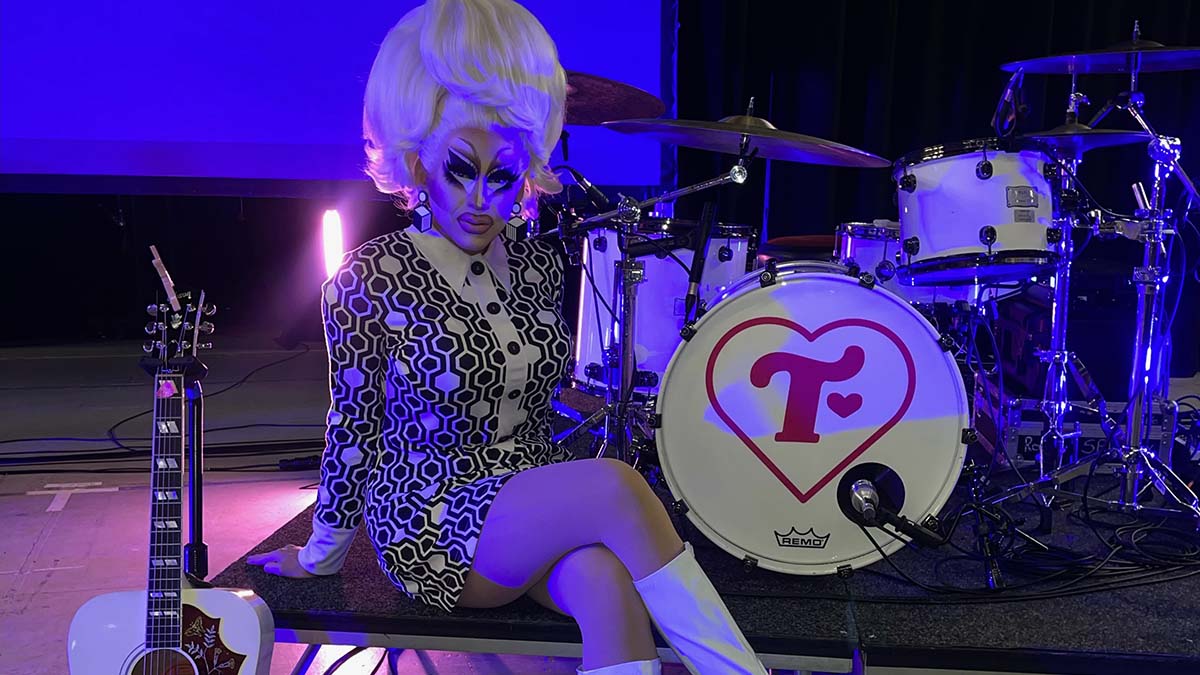
“I guess, because I’m self-taught – I mean, I’ve never had a lesson – so, I learned about things like Carter scratch and stuff later, but I didn’t really know what it was. And then I would say in my early 20s, that’s when I really started drilling and learning fingerpick styles and arpeggiation.
“That’s I would say the backbone of what you hear on my tracks now. It’s a lot of finger-style strum patterns, which I think I’m pretty – I probably have a dozen or so patterns that I really lean on, that I know I can focus on singing and playing and let my hands just do it.
“But I would say that’s the age I started figuring out my style. I was in high school and into college just strumming. But once I started playing lead lines and stuff and playing finger-style while strumming, I think my style developed.”
Speaking of acoustic, you’re known as something of an “acoustic country dive.” I think you’ve called yourself that, actually. So, how does drag fit together with music, your music, and perhaps more specifically the type of electric guitar music on your new album?
“I think originally I got – I had a double life, right? I was doing drag, lip synching in night clubs to make money. But then on the other nights, I was doing open mics and songwriter showcases out of drag.
“So, then after I did RuPaul’s Drag Race and started doing television and standup for a living – because I was doing standup comedy at the time, full-time – then I started going a little more Sarah Silverman or Adam Sandler or Bo Burnham, where I started working my guitar into my act.
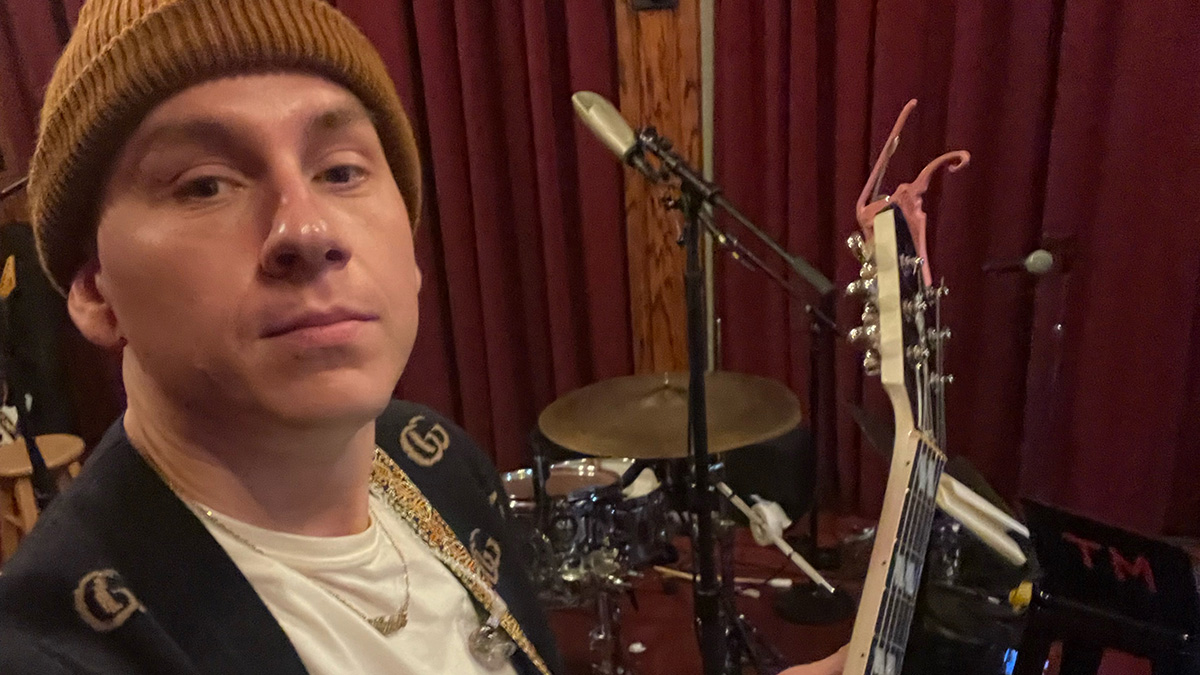
“I was like, ‘Well, if I write all these songs, they’re not necessarily comedy. But if I put them in my show that is all comedy, I think it adds dynamics.’ You know, if I do a bunch of standup about being single and then I do a somber song about being broken up with, to my surprise it really worked!
It’s pretty obvious from listening to the record that I’m obsessed with the Shins, I’m obsessed with Aimee Mann
“So, then my mind kind of opened to ‘Wow I should be doing my standup act and playing my songs.’ Like a Dolly Parton or Sarah Silverman Jesus Is Magic, where there’s storytelling and songs and they go one and the same.
“I would say that wasn’t until I was 25 or 26 when that was – I just always thought, honestly when I started doing drag I thought that it was me throwing in the towel on playing music, period. Not bitterly. But I thought, “Well, oh, drag pays the bills.” You know, Trixie is so one in a million and I’m a bald white guy with a guitar. It’s like, that’s not one in a million. So, one was lucrative and one was just an uphill battle.
“The week I got cast on Drag Race, I remember the Pot Belly Sandwiches in Milwaukee down the street from my house, I auditioned to play there, and they said no! So, it was hard to have an identity I guess out of drag, playing my music. It was hard – I feel like I was really offering something that didn’t exist. But as Trixie doing standup and working in these songs, I know that I’m offering something that doesn’t exist, you know?
“Some of my songs you can tell I write for drag, like Hello Hello is very electric guitar-driven, almost The Donnas-sounding. But then a lot of my music, you can tell, like This Town, which I played on Kimmel last night, that I did not write thinking, ‘This is going to be amazing in drag!’ I just wrote it because I had that feeling and I just wrote it. So, a lot of times it’s not, like, a grand scheme.
“Sometimes the songs like Hello Hello or C’Mon Loretta I know that would be so fun to play in drag. And then some of it, I’m just like, 'I wrote this in my own time and I really like it so I’m going to find a way to work it into the show, because I think the audience will like it.'”
Okay, the new album! What would you like to say about the genesis of the new record? It’s got glamourous and fun sides. It’s a double-album. There are great songs like Boyfriend and Vacation on there. It’s power pop, sunny and bright often. What would you like to say about writing and recording it?
“I think you really hit it on the head as far as the sound. I think it’s pretty obvious from listening to the record that I’m obsessed with the Shins, I’m obsessed with Aimee Mann.
Writing music in a sort of deserted Hollywood at the time was kind of a vibe, right?
“I love really clever lyrical turns of phrase combined with really sugary sweet power pop. And I think because I wrote most of this during COVID in my house in Hollywood – I mean, writing music in a sort of deserted Hollywood at the time was kind of a vibe, right?
“It’s like, I can see the Hollywood sign outside my window and the city was, like, vacated. So, it was interesting that my instincts were to write very sugary fantastical music.
“A lot of these – like, Boyfriend is about imagining a relationship, right? Hello Hello is about an imagined relationship. You can tell I was climbing the walls a little bit and in more of a fantasy world. Because this music is more upbeat and sunny and bright and sugary and I wrote it at a time when the world was falling apart.
“So, I guess, it’s interesting that instinctually my mind – maybe as a drag queen my mind went straight to 'What can we fabricate that’s not necessarily based in reality?' And I also wrote twice as much.
This music is more upbeat and sunny and bright and sugary and I wrote it at a time when the world was falling apart... maybe as a drag queen my mind went straight to, 'What can we fabricate that’s not necessarily based in reality?'
“Normally my albums are about half the length, but the reason we had enough songs for two was because I had a lot of time at home, a lot of time with just my instruments in my free time. And I knew I wanted to call it the Blonde and the Pink albums because I wanted to just feel very essential.
“When you think of Trixie, you think of pink outfit and giant blonde hair. I don’t think I’ll ever do a record this big or with as much production. I mean, my records normally have a lot more organic instruments and less produced tracks. This one has a lot more plug-ins as far as the sounds you hear. So, I really wanted it to feel like the essential Trixie album.”
What can you say about the gear you used for the writing and recording processes? What pedals, guitar amps, guitars did you employ for the double-record?
“Well, I learned on a Telecaster. Well, I learned on acoustic instruments – I think I played Ibanez as a teenager. But now, pretty much my 20s into now, I’ve always played, as far as acoustics, I always play [Gibson] Hummingbirds. Hummingbirds or Doves, pretty much all the time.
I had a huge Fender Twin reverb setup that was in terrible shape... when I think back about me blindly reaching in to a bunch of decayed wires and wiggling them around, I’m lucky I wasn’t electrocuted
“My voice has a lot of mid. It doesn’t have a lot of ring and it doesn’t have a lot of low-end. It has a lot of mid. So, I think the Hummingbird sound really complements it because a lot of metallic crunch, a lot of kick.
“Then I learned playing electric guitar – in high school, I had a huge Fender Twin reverb setup that was in terrible shape. I mean, I had to reach in – when I think back about me blindly reaching in to a bunch of decayed wires and wiggling them around to try and get the buzz to stop, I’m like, I’m lucky I wasn’t electrocuted.
“So, I think of myself at 16-years-old with acne, reaching my hand into the hollow back of a giant Twin amp and hoping I’m not getting shocked.
“But I’m a pretty rudimentary electric guitar player but when I’m trying to write something that I know I want upbeat, I’ll usually play – I have a custom Telecaster that is pink glitter and I’ll haul that out into the living room. And I play EarthQuaker Devices and a bunch of Fender pedals for my overdrives and stuff.
“When I’m making demos, that’s when I’ll pull my iPhone out and plug a microphone into it and I’ll just stand in my living room with my little – if I’m really lazy, I’ll plug into a little mini practice amp, just to get the things out.
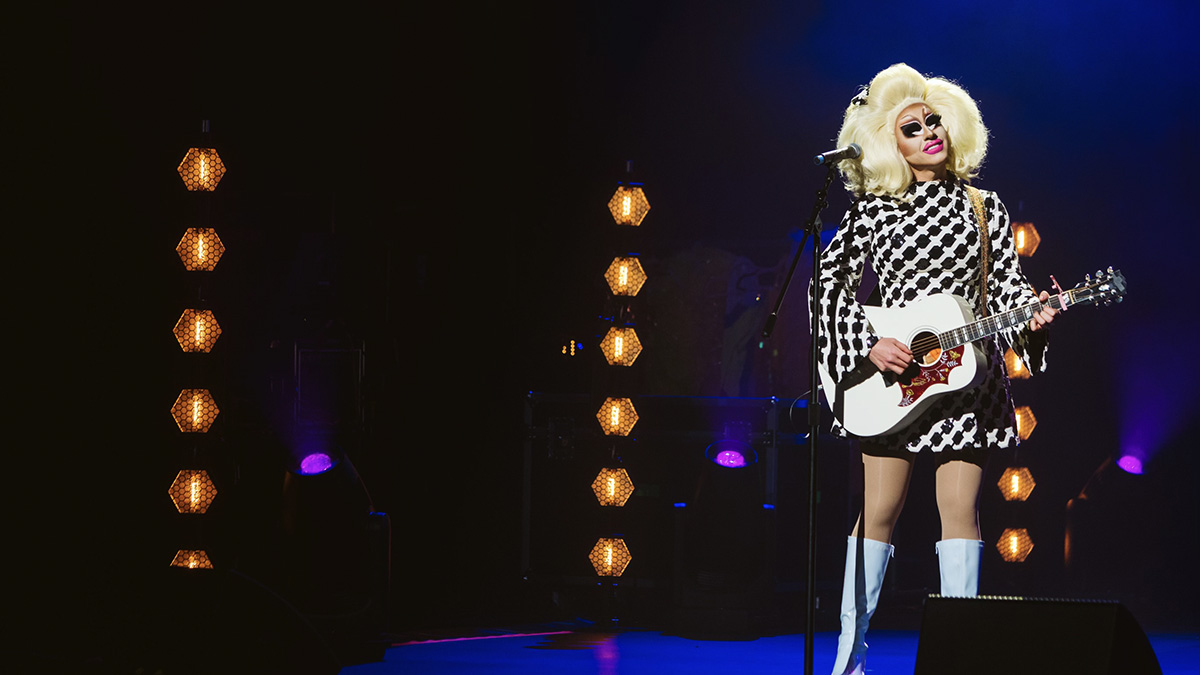
“Sadly, I thought I was a really good electric guitar player until I started hiring professional guitar players and I was, like, ‘Never mind!’ Because I never played in bands in high school and I never played with other musicians until probably two years ago.
My grandpa, who was my idol, he always said that being a musician was 40 per cent how good you are and 60 per cent how good you look doing it.
“I’ve always been a solo performer. I will say I was pleasantly surprised at my acoustic fingerpick style. My guitar skills are very formidable as far as going out into the world and seeing other people. My electric guitar skills, though – oh my god!
“My first guitar player, when I first started seeing him play, I was like, ‘I’m going to hang it up. I shouldn’t be allowed to play the guitar in front of these people!’ He was very inspiring but also – like I said, I grew up in the woods by myself. So, I didn’t exactly have instruction. Everything I do is very made up. Made up!”
You’re very good at connecting with your audience. You’re often trending on Twitter, you have lots of fans and are involved in lots of lucrative creative ventures. Do you think about that at all and, if so, how does the guitar help you with those aims?
“I do think about that a lot, actually! I’m a product, right? I’m a small business and I’m a product. So, everything has to be – it’s showbusiness, so everything has to be thought of about how do you get this to who you want. Who needs to hear this and how do you get this to them. Right? That’s the main thing. I love this product. Trixie. These songs. I love the jokes. I love Trixie. For people who love Trixie, how do we make them know about it?
You want to offer what someone else can do but do it in a little bit higher heels and bigger hair. I mean, that’s just something to live by
“With drag, it’s so saturated. There’s so many drag artists. And for me, it was like, once I realized, especially for comedy, once I realized adding guitar playing – it adds showmanship and it adds an earnestness. It adds a warmth and it adds a reality. It adds so much color to the character that there’s this developed, organic hands-to-strings skill that you can use in your storytelling.
“And in a competitive market, me being able to access this in my comedy, or moments when it’s not comedy, like something kind of somber. Usually in my shows, there will be one tear-jerker just to add levels.
“If I can do something that other drag queens can’t do or if I can do something that other musicians do but I can do it dressed way cooler? That’s just good business. You want to offer what someone else can do but do it in a little bit higher heels and bigger hair. I mean, that’s just something to live by.
“And my grandpa, who was my idol, he always said that being a musician was 40 per cent how good you are and 60 per cent how good you look doing it. And I think I still feel that way. I mean, I didn’t know I’d be doing drag. But if you’re going to do something cool, you might as well look as cool as you can while you’re doing it.
“I’m very assaulting. My music career is just part of what I do. So, at this point, on YouTube or on television – at this point you have to actively avoid me, you know?
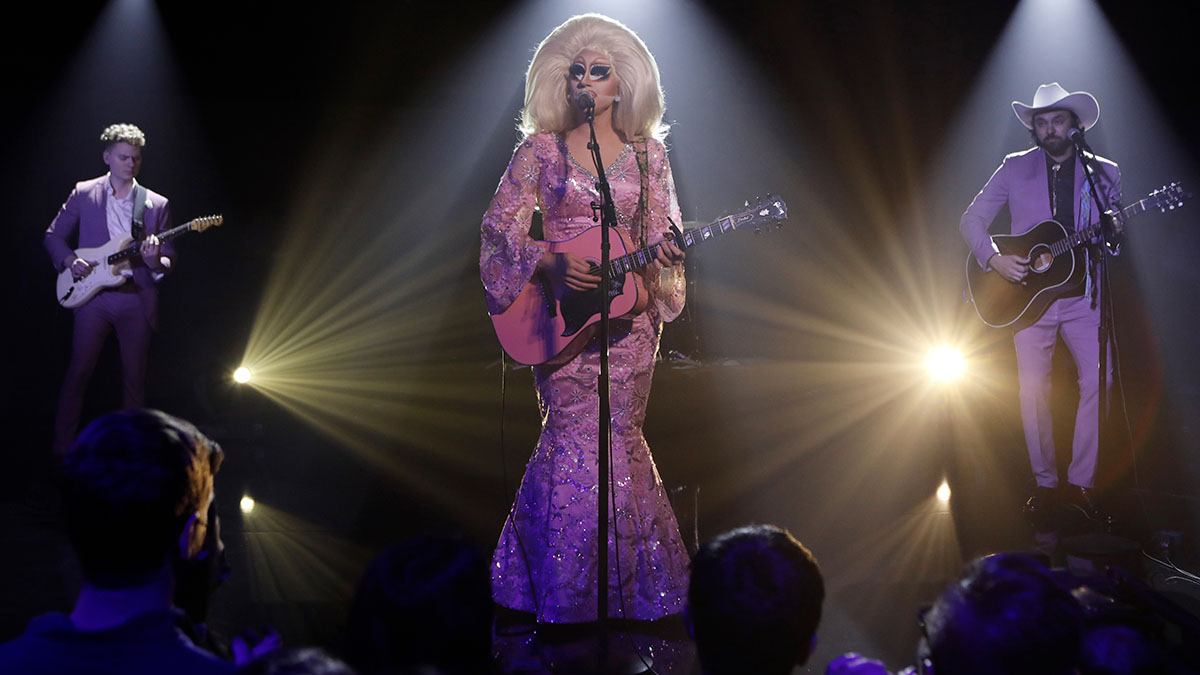
“At my shows, there will be people who only know my music. There will be people who only know my comedy or my specials. There will be people who only know my book or makeup company or my YouTube channel. So, people like me for a lot of different reasons and whoever they are, I just try to keep them fed in that sense you know?
“A lot of guitar players, I was a singing-songwriter person where I’d write songs and go play them out by myself. I think you just need to think of yourself as a product and really honestly look at yourself and say, 'How do I make my act so that if somebody wants me, I’m the only phone call they can make.'
You know? And I wanted to create an act that wasn’t just like, ‘We need a drag queen, a general drag queen.’ If they want a singing, guitar playing, joke telling Barbie doll, they have to get me. Or they have to get Dolly Parton.”
How about the future? How are you thinking about your relationship with guitar as it pertains to the future, to getting better, to growing with it?
“Wow, that is so interesting, nobody’s ever asked me that. Well, what’s weird is – I’m from a very small town, right? My graduating class was, like, 30 people. I was the only person I knew playing guitar my age my whole life. So, I didn’t have formative experiences of, like, being in bands. I didn’t have any of those really, what I’ve learned is, very common experiences, people being in bands and stuff.
I think that guitar is accessible because I grew up dirt, dirt, dirt, dirt poor... I love when Martin or Fender or Gibson offers a series of guitars that are accessible to people
“And I think that guitar is accessible because I grew up dirt, dirt, dirt, dirt poor. It’s like rich people play piano or like religious kids play piano. And then the rest of us maybe have a guitar hanging around the house.
“I’m lucky that guitar is accessible and I hope that in the future, nice guitars keep getting made at [reasonable] price points. I love when Martin or Fender or Gibson offers a series of guitars that are accessible to people.
“I mean, a 25-year-old person cannot afford a $3,000 instrument. So, their way to work up to that is to get a really great $1,500 instrument that sounds great that can get them through gigs to get them to that professional player level on the instrument. So, I guess I just hope that guitar continues to success because it continues to stay accessible. That’s really important to me.
I love seeing music in comedy, too. I hope guitar shows up more and more in comedy
“And I would like to continue to get better – I mean, I have gotten better over the years. I think I’m playing now probably better than I ever have. As far as being able to really depend on myself to play, like, fingerpick patterns accurately, I think on tour with the click in my ears and stuff, I get really critical.
“And then when I would go out in the house and I would have them isolate my voice and the guitar for some of these songs, I just wanted to hear what I was doing, and I would be like, ‘Oh my god, I’m really not as – I’m doing this. That sounds like real guitar playing!’ And I love seeing music in comedy, too. I hope guitar shows up more and more in comedy.”
What do you love most about the guitar?
“It’s just – I don’t sit and play for hours. I usually pick it up four or five times a day for five minutes. I like that about it, it’s like a reset for me. It’s just very calming to me. Like, when I’m backstage and nervous, I’ll play my guitar and it keeps me from being nervous.
“I guess I feel like it’s marketed as a very aggressively masculine heterosexual instrument. And I guess I never felt that way. I find it interesting that I don’t know many gay men who play guitar, like at all. I maybe know two.
“And they’re not even that good. I wonder why that is. I find it interesting that gay guys don’t play guitar. And I guess that’s one of my favorite things about playing it: I’m just happy to be a male identifying gay person out there playing guitar, you know?”
- The Blonde & Pink Albums are out now via PEG Records.
